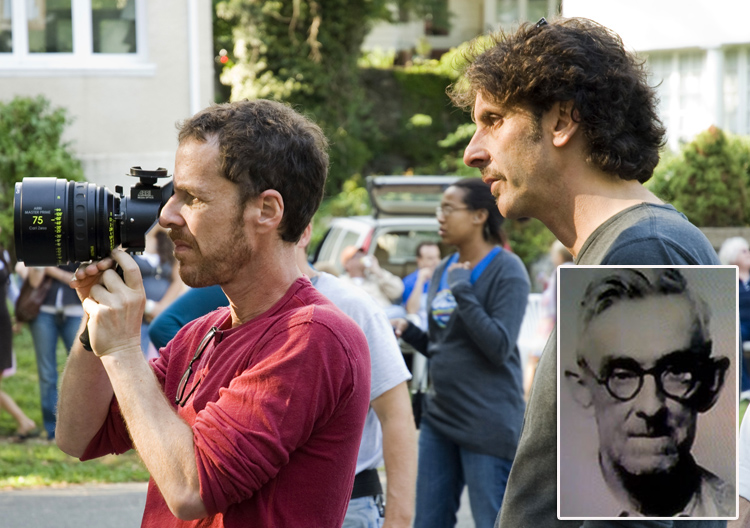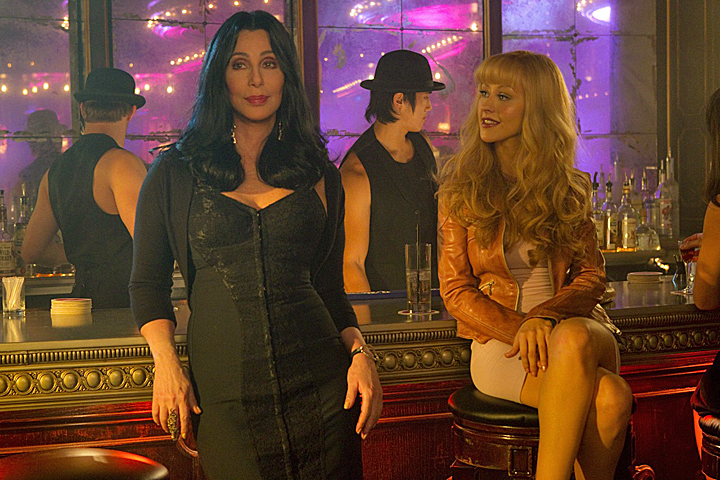Q. At the end of “Sullivan’s Travels,” Joel McCrea is flying to Hollywood. On a table is a book: Oh, Brother, Where Art Thou. He says he’s not going to make it as a movie because he wants to make more uplifting movies. Is there a relationship to the George Clooney movie by the same name?
Patrick Cal, Rockford
A. The credits for “O Brother” say the screenplay was inspired Homer’s Odyssey. Neither Alibris nor Amazon identifies any actual book named Oh, Brother, Where Art Thou. But the Coens have undoubtedly seen “Sullivan’s Travels,” and maybe that’s where they discovered the title. It’s like them to plant little inside jokes.
At Venice for the world premiere of their new film, “Burn After Reading,” they explained that after “O Brother, Where Art Thou?” (2000) and “Intolerable Cruelty” (2003), it concludes the “Idiot Trilogy” they were making with Clooney. Those boys, what kidders. They claim their films are edited by their aged uncle, Roderick Jaynes. That’s a pseudonym for the two of them. When Jaynes was nominated for an Oscar for “No Country for Old Men,” the Coens thoughtfully provided a family photo of him.
Q. I’ve noticed that so many of my favorite films only get a 3.5 star rating. I’m curious what it is about a film like “The Dark Knight” that allows you the make the final leap to four stars, while a film like “American Beauty” doesn’t quite make it? I’ve read your reviews for both films and found them insightful. The part I find perplexing is the star rating.
Nick Jones, Fort Collins, Colo.
A. The opposite of the previous question. Let’s say that to make the leap to four stars, a movie should make either my spine or my brain tingle.
Q. I was intrigued by your explanation that a movie can only earn a “zero stars” rating if it offends you on a moral level. I think that’s fair. But I can’t help wondering what does this mean for your mantra that “it’s not what the movie is about that makes it good or bad, but how it is about it”?
Isn’t it fair to say that “Death Race 2000” earned zero stars because of what it was about (running down children and the elderly in cars) more than how it was about it? Also, I notice from the archives that many “torture porn” films (“Chaos,” “Wolf Creek“) earned zero stars because you were disturbed that they used violence for its own sake. What do you do with a film that is about something that offends you morally, but is successful at being about that?
Ray Froklage, Ottawa, Canada
A. First of all, the star rating system is a waste of time. I hate it, but I’m stuck with it because my competitors use it, too. I would have trashed it long ago if Siskel hadn’t ripped it off for the Tribune. Now it’s like the nuclear race: Unilateral disarmament could be dangerous. If an immoral movie is good, I would say so. See my review of “The Birth of a Nation.”
Q. I don’t like it when they compare movie receipts against adjusted figures. For example, although “The Dark Knight” is second now on the all-time list of money-makers, it is actually in the 30s when adjusted for inflation. It’s like you are comparing apples to apples when you really aren’t.
I love “Gone With the Wind“; however, in 1939, its only major competition was radio. Now there are TV, VCRs, DVDs, so that I don’t have to go to the cinema anymore to watch the movie. I can wait and watch it at home where it’s cheaper. You just really can’t compare receipts today with yesterday. Do you agree?
Cal Ford, Dallas
A. You caught me with a U-turn there. I thought you were going to say “GWTW” should be higher than “TDK” on the list, but you told me why it’s cheaper to watch at home. My guess is, in 69 years “TDK” will be cheaper, too. Adjusted for inflation, of course. Those lists have little significance, except as a way for studios to brag about today’s movies.
Q. I have built up a large array of DVDs based mainly on your reviews. My problem now is that I can’t usually decide which movie to view next, and sometimes I spend an hour or two trying to make up my mind. It drives my wife crazy! Do you have any ideas or suggestions on how to pick a movie out of hundreds of choices? My wife thanks you in advance.
David Mauk, Las Vegas
A. View them alphabetically, or by how they happen to line up on the shelf. First, you might want to divide them into categories, such as drama, humor, etc. Then let your wife decide what category she’s in the mood for. This might save your marriage.
Q. Yo dude, u missed out on “Disaster Movie,” a hardcore laugh-ur-@zz-off movie! Y U not review this movie!? It was funny as #ell! Prolly the funniest movie of the summer! U never review these, wat up wit dat?
S.J. Stanczak, Chicago
A. Hey, bro, I wuz buzier than $#i+, @d they never shoed it b4 hand. I peeped in the IMDb and saw it zoomed to #1 as the low$ie$t flic of all time, wit @ lame-@zz UZer Rating of 1.3. U liked it? Wat up wit dat?
Q. Why is “In Search of a Midnight Kiss” being shown in color (other than its opening moments) on cable video on demand in New York? The movie was released theatrically entirely in black and white, right?
Jeff Berman, Levittown, N.Y.
A. Indeed it was and should have been. The film’s writer-director, Alex Holdridge, writes me: “The answer is clearly one of U.S. market forces and not creative choices. The movie was always conceived in black and white. Never once did we look at a single color, except in terms of its grayscale, and we only watched the dailies with the colors off. But we did shoot most of it in the color setting, because it has a slightly better grayscale, with the intention of changing it back to a better black and white later.
“When the U.S. distributor learned we had most of it in color, then it was immediately a point of negotiation. Fortunately, the Europeans never took interest in this debate and released it as it was always intended in black and white. So far it has been in the U.K. and Greece theatrically in black and white and done very well. And it is set to come out in markets on every continent in black and white.
“I wrote a long letter to everyone involved on why it should remain black and white. The U.S. negotiation settled with a compromise. They would release theatrically in black and white, but we needed to deliver a color version of the movie for On Demand. I guess they thought people would not download it black and white, and they would not accept a deal otherwise.
“We then had to set out to reshoot several scenes to be able to deliver a color version because sometimes we shot in genuine black and white when we didn’t reset the camera to color. We took advantage and fixed a few things we always wanted to improve, anyway, and made the movie a little better, I think. So both versions are the same other than the color.
“Regardless, in the strange, shifting sands of the current U.S. distribution market, at least we found a distributor willing to help finish the film print and release it in theaters in black and white as we had always envisioned.”












